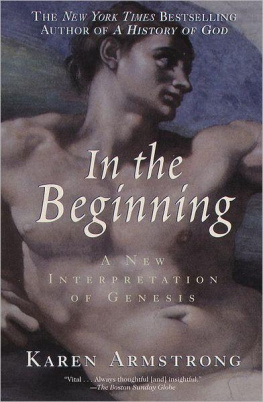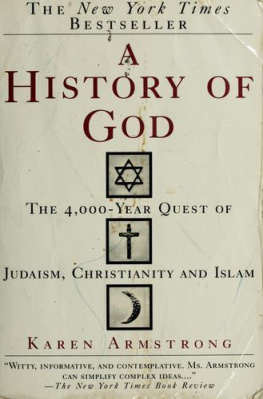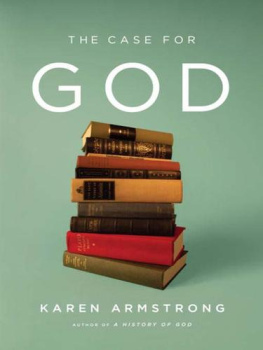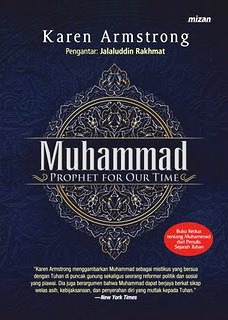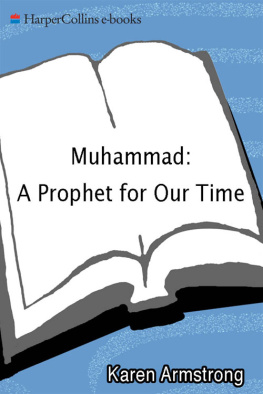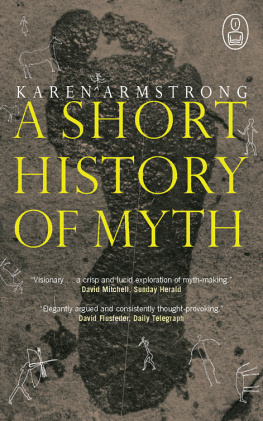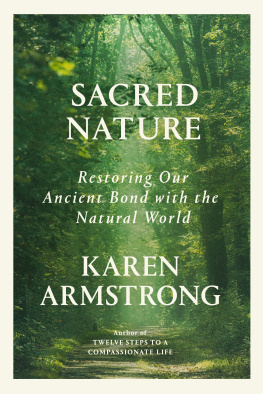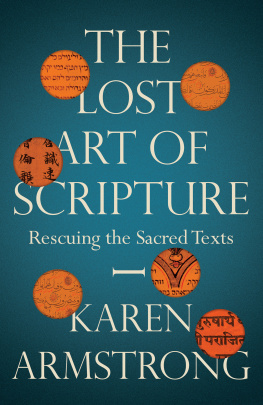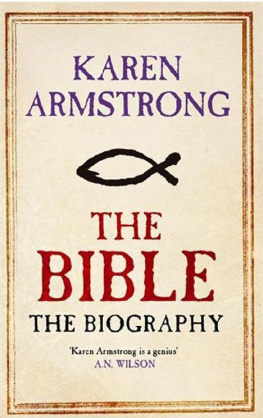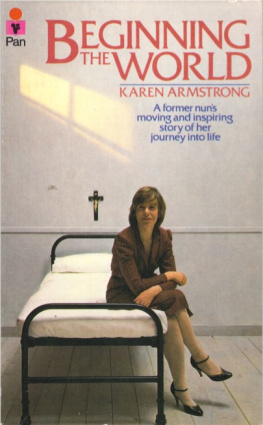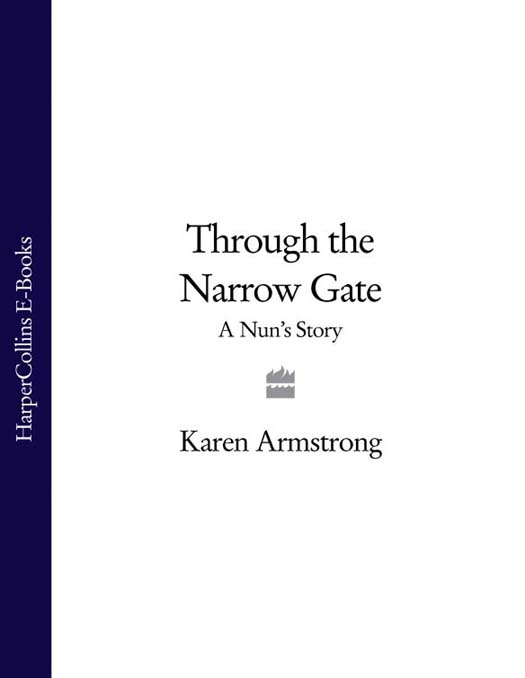KAREN ARMSTRONG
Through the Narrow Gate
A Nuns Story
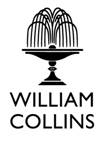
In memory of my father
W riting Through the Narrow Gate proved to be a watershed for me that was, in its way, every bit as important as those crucial years in the convent. I had decided to write the book because I was becoming uncomfortably aware that a period of my life that had been extremely significant was becoming trivialized. Friends would beg me to tell them about the convent, and I would usually respond by recounting some funny story (and, indeed, a lot of amusing things did happen) because it was easier than exposing memories that were still raw and painful. Yet I knew that I would have to discover what those years had meant for me before the memories disappeared beyond recall.
In fact, the process of writing redeemed the past for me, in ways that I could not have imagined. I have written several books since, but none has proved as difficult as Through the Narrow Gate, with the possible exception of its sequel, Beginning the World. Autobiography must be one of the most challenging genres because it becomes impossible to keep humiliating glimpses of ones former self at bay. Not surprisingly, I tried to avoid this but was prevented from doing so by June Hall, whom I had met at a dinner party and who had agreed to act as my literary agent.
The first draft of the book was very black and angry. June read it, said that it was probably publishable but that she couldnt help wondering why, if things had been that bad, I had stayed in the religious life for seven whole years. I could see that she had a point, and I started all over again. During the next two drafts, I began to remember the things that had made me stay so longthings that I no longer wanted to recall because I thought that I had lost them forever: the beauty of the liturgy, the belief that every single moment of the day had eternal significance, and, above all, the sense of a spiritual quest for meaning that would make my life wholly significant. I had gone into the convent searching for Something that remained tantalizingly elusive but that, with the optimism of youth, I felt certain I would one day find.
I did not find that Something (which, for want of a better word, we call God) in the convent. These pages explain why. The 1960s were a difficult time for religious orders, and I must have been one of the last people to be trained before the Second Vatican Council reforms were implemented. At that time, it had unfortunately become customary to train young nuns by making them excruciatingly aware of their failings. This meant that most of us lived in a state of such acute anxiety and preoccupation with ourselves that a positive religious experience could become well nigh impossible. After all, the great masters of the spiritual life insist that the true spiritual path leads us away from the ego. Guilt and an undue concentration on ones own performance can only further embed the struggling soul in the self that it is trying to transcend. There were certainly nuns in my order who were well aware of this problem, but as a mere teenager I lacked the maturity or the confidence to see the particular obsessions of my superiors in a larger perspective.
When I wrote Through the Narrow Gate, I thought that I had finished with religion. Yet because of the book, I was invited to write and present a documentary series for British Channel 4 Television about Saint Paul. Much of the filming was done in Jerusalem, and there, for the first time, I confronted Judaism and Islam, Christianitys two sister religions, as living, integral faiths. In order to understand the early church founded in large part by Saint Paul, I had also to learn about the Jewish world that gave birth to it. For the first time, Judaism became more to me than a mere prelude to Christianity, and I was increasingly fascinated by the differences and similarities between the two faiths. In the same way, living and working so intensely in the Middle East made me want to learn about Islam, and I was frequently enthralled by what I found. After I had finished the television series, other assignments followedall concerned with religion. I began to flesh out the grounding in scripture, theology, and church history that I had acquired in the convent, but this time I was seeing it in conjunction with the development of other faiths.
At first my new involvement in religion remained on an intellectual, critical level. But as I went deeper into the history of religion, I began to experience that sense of being on a quest that had impelled me to become a nun and had kept me in the convent for all those years. It was different, of course, because I was an older andI hopewiser person this time around. Though particularly drawn to the study of mysticism, I knew from my attempts at meditation in the convent that I did not have it in me to be a mystic. Yet occasionally, when I am studyingeither at my desk at home or in the British LibraryI have what can only be described as a glimmer of transcendence. It only lasts a fraction of a second, but it gives one the sense that life has some ultimate meaning and value for that brief moment, in much the same way as a great piece of music or an inspiring poem. There is no way of categorizing that Something any more than it is possible to explain why art or music has this power; it cannot be summed up in a message or doctrine. But I now know enough to realize that what I am engaged in is what the Benedictine monks call lectio divina (divine study), which, they say, yields occasionally an inevitably brief second of oratio (prayer).
When I spoke of this experience to some of my colleagues at the Leo Baeck College in London, where I do a little teaching, they laughed and told me that I was very Jewish in my spirituality. Jews, they explained, immerse themselves in the Bible and the Talmud not simply to gain information; they see the text as a place where they can encounter the ineffable God. Sometimes they like to speak the Hebrew words aloud, savoring the words that God himself used when he revealed himself to Moses on Mount Sinai, until they have learned them by heart (a revealing phrase). They sometimes sway backwards and forwards while they recite the Hebrew words, as though they were blown by the breath of the Holy Spirit, pliable before God as a flame before a breeze. Occasionally, they get a sense of Something greater that lies behind and within the words but defies explanation.
I am not claiming any great visionary experience, yet occasionally while studying theology, I too feel uplifted by a second of wonder and delight that momentarily illuminates the whole page. This type of spirituality would, it seems, have suited me better than the kind of meditation we learned in the convent. Everybody comes to the divine in his or her own way, and it seems that my writing and broadcasting career, which has often been critical of certain aspects of religion, has led me back to some form of religious life.
I could not have known this when I sat down to write Through the Narrow Gate in 1980. I am no longer a practicing Roman Catholic, but I usually call myself, slightly tongue in cheek, a freelance monotheist. At present I draw sustenance from other traditions as well as from Western Christianity. The study of comparative religion, I am told, rarely inspires a person to convert to another faith but it makes him see his own religion differently. I can now appreciate what the spirituality I learned in the convent was aiming for and, perhaps, where it went wrongat least for me. It also seems that the quest that began on the fourteenth of September, 1962, the day I entered the religious life, has continued, and led me to paths that I never expected.


